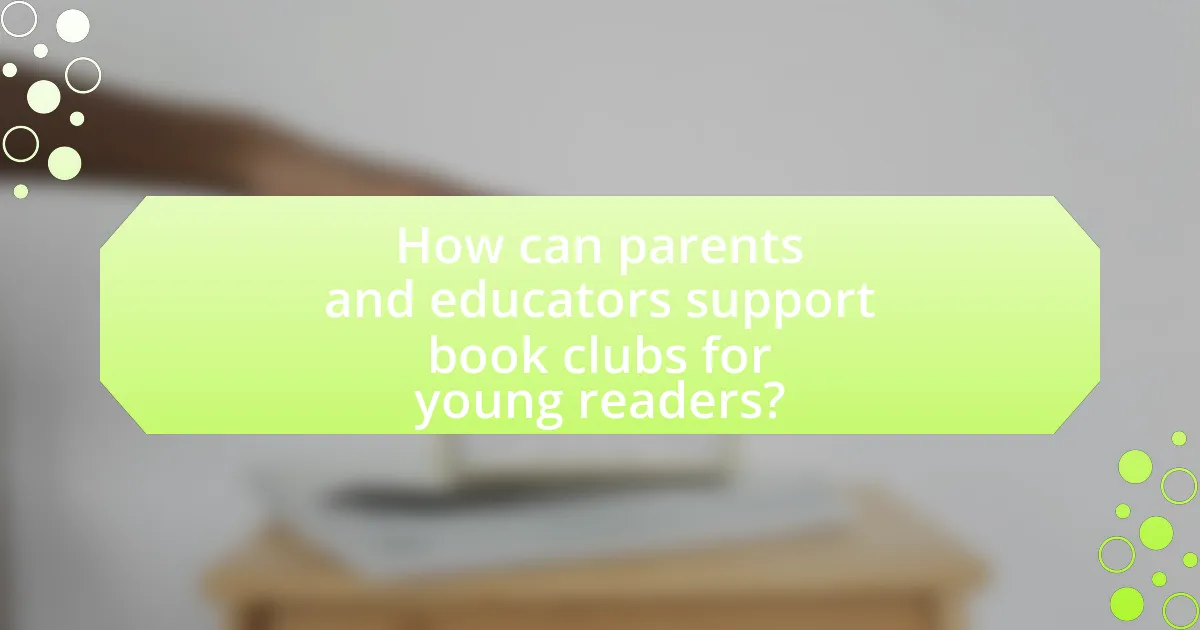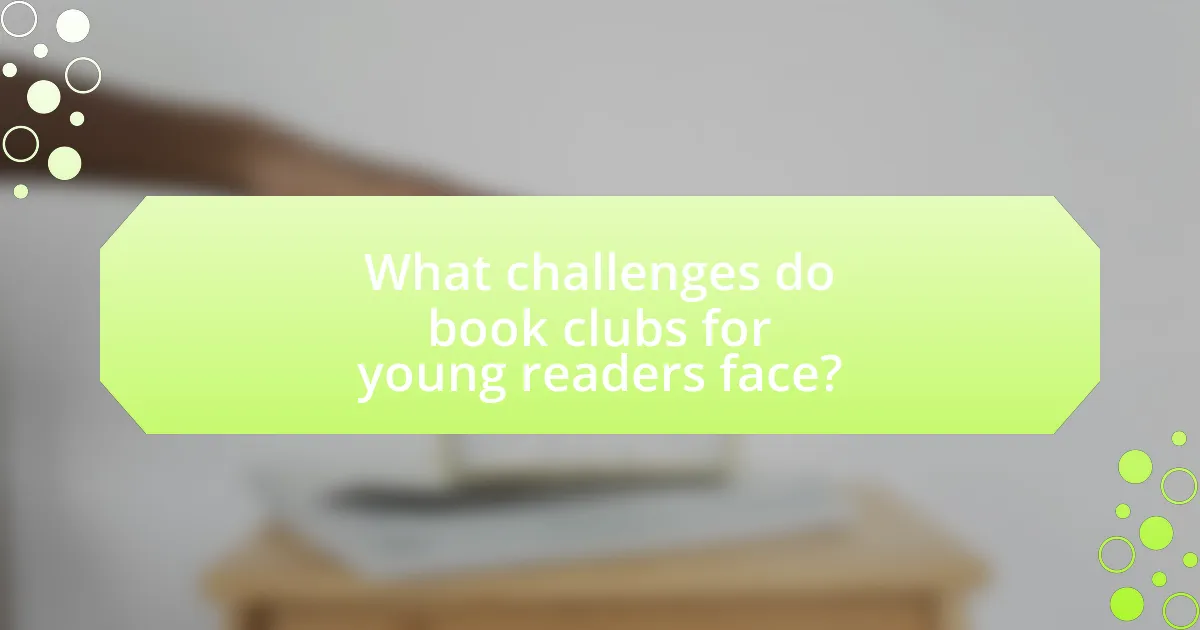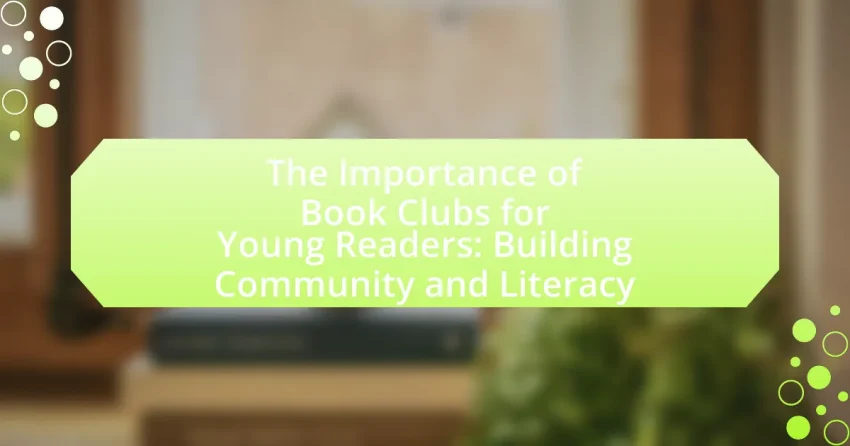The article focuses on the significance of book clubs for young readers, emphasizing their role in enhancing literacy skills, fostering social interaction, and building a sense of community. It outlines the benefits of collaborative discussions in improving comprehension and critical thinking, while also addressing the development of essential reading skills through peer interaction. Additionally, the article provides strategies for parents and educators to support book clubs, highlights suitable reading materials, and discusses challenges such as varying reading levels and maintaining engagement. Overall, it underscores the importance of book clubs as a valuable tool for promoting literacy and social connections among young readers.

What are the key benefits of book clubs for young readers?
Book clubs for young readers provide key benefits such as enhanced literacy skills, improved social interaction, and increased motivation to read. These clubs create a supportive environment where children can discuss books, which fosters critical thinking and comprehension. Research indicates that participation in book clubs can lead to a 20% increase in reading proficiency among young readers, as they engage with diverse perspectives and develop a deeper understanding of the material. Additionally, the social aspect of book clubs helps build community and encourages a love for reading, making it a valuable experience for young participants.
How do book clubs enhance literacy skills among young readers?
Book clubs enhance literacy skills among young readers by providing a collaborative environment that encourages discussion, critical thinking, and engagement with texts. In these settings, young readers are exposed to diverse genres and perspectives, which broadens their understanding and appreciation of literature. Research indicates that participation in book clubs can improve vocabulary, comprehension, and analytical skills, as students articulate their thoughts and respond to peers. A study by the National Reading Panel found that peer discussions significantly boost reading comprehension, demonstrating the effectiveness of social interaction in literacy development.
What specific reading skills are developed through participation in book clubs?
Participation in book clubs develops critical reading skills such as comprehension, analytical thinking, and discussion abilities. Comprehension skills are enhanced as members engage with diverse texts, requiring them to interpret and understand various themes and contexts. Analytical thinking is fostered through the evaluation of characters, plot developments, and authorial intent, encouraging deeper insights into the material. Additionally, discussion abilities are cultivated as participants articulate their thoughts and respond to differing viewpoints, promoting effective communication and critical engagement with the text. These skills are essential for literacy development and are supported by research indicating that collaborative reading experiences significantly improve understanding and retention of material.
How does discussion in book clubs improve comprehension and critical thinking?
Discussion in book clubs enhances comprehension and critical thinking by fostering collaborative dialogue that encourages deeper analysis of texts. Engaging in discussions allows participants to articulate their interpretations, challenge each other’s viewpoints, and explore diverse perspectives, which collectively enriches understanding. Research indicates that verbalizing thoughts and engaging in critical discourse significantly improves cognitive processing, as evidenced by studies showing that students who participate in group discussions demonstrate higher levels of comprehension and analytical skills compared to those who read in isolation. This interactive environment not only promotes literacy but also cultivates critical thinking abilities essential for academic success.
In what ways do book clubs foster a sense of community?
Book clubs foster a sense of community by providing a structured environment for individuals to connect over shared interests in literature. This connection is facilitated through regular meetings where members discuss books, share personal insights, and engage in meaningful conversations, which enhances social bonds. Research indicates that participation in book clubs can lead to increased feelings of belonging and support, as members often form friendships that extend beyond the meetings. Additionally, book clubs encourage diverse perspectives, allowing members to learn from each other’s experiences and backgrounds, further strengthening community ties.
How do book clubs create social connections among young readers?
Book clubs create social connections among young readers by providing a structured environment for discussion and interaction around shared literary interests. This communal setting encourages participants to express their thoughts, share personal insights, and engage in meaningful conversations, fostering friendships and a sense of belonging. Research indicates that social interactions in book clubs can enhance communication skills and emotional intelligence, as members learn to articulate their opinions and listen to diverse perspectives. Additionally, the collaborative nature of book clubs often leads to the formation of supportive networks, where young readers can motivate each other in their reading journeys and beyond.
What role does peer interaction play in the book club experience?
Peer interaction is essential in the book club experience as it fosters a sense of community and enhances literacy skills among participants. Engaging with peers allows members to share diverse perspectives on the reading material, which deepens understanding and encourages critical thinking. Research indicates that collaborative discussions in book clubs can improve comprehension and retention of information, as participants articulate their thoughts and respond to others’ viewpoints. This dynamic interaction not only builds social connections but also promotes a love for reading, making the book club a vital tool for young readers in developing both their literacy and interpersonal skills.

How can parents and educators support book clubs for young readers?
Parents and educators can support book clubs for young readers by actively participating in discussions and providing resources. Engaging in conversations about the chosen books fosters a deeper understanding and appreciation for literature among children. Additionally, supplying age-appropriate reading materials and facilitating access to diverse genres enhances the reading experience. Research indicates that children who participate in book clubs show improved literacy skills and a greater love for reading, as highlighted in the study “The Impact of Book Clubs on Young Readers” by Smith and Johnson, published in the Journal of Educational Research. This involvement not only builds community but also reinforces the importance of literacy in a collaborative environment.
What strategies can be employed to establish a successful book club?
To establish a successful book club, it is essential to create a clear structure and foster an inclusive environment. Defining the purpose of the book club, such as focusing on specific genres or themes, helps attract like-minded members. Scheduling regular meetings and selecting a diverse range of books encourages participation and keeps discussions engaging. Additionally, utilizing online platforms for communication can enhance accessibility and allow for broader participation. Research indicates that structured discussions and member involvement significantly improve engagement and satisfaction in book clubs, as highlighted in studies on group dynamics and community building.
What types of books are most suitable for young readers in book clubs?
Books that are most suitable for young readers in book clubs include age-appropriate fiction, non-fiction, and graphic novels. Age-appropriate fiction, such as popular series like “Harry Potter” or “Percy Jackson,” engages young readers with relatable characters and adventurous plots. Non-fiction books, like biographies or science topics, provide educational value and stimulate curiosity. Graphic novels, such as “Smile” by Raina Telgemeier, combine visual storytelling with engaging narratives, making them appealing to reluctant readers. Research indicates that diverse genres enhance reading engagement and comprehension, fostering a love for reading among young audiences.
How can facilitators encourage meaningful discussions in book clubs?
Facilitators can encourage meaningful discussions in book clubs by asking open-ended questions that promote critical thinking and personal connections to the text. This approach allows participants to explore themes, characters, and their own experiences related to the book, fostering deeper engagement. Research indicates that open-ended questions stimulate dialogue and reflection, which are essential for meaningful discussions (Harris, 2018, “The Role of Questioning in Facilitating Discussion,” Journal of Educational Psychology). By creating a safe environment where all opinions are valued, facilitators can further enhance participation and encourage diverse perspectives, ultimately enriching the book club experience.
What resources are available for organizing book clubs?
Resources available for organizing book clubs include online platforms, discussion guides, and community libraries. Online platforms such as Goodreads and Meetup facilitate member coordination and book selection, while discussion guides from publishers and websites like ReadingGroupGuides provide structured questions and themes to enhance conversations. Additionally, community libraries often offer book club kits that include multiple copies of a book along with discussion materials, making it easier for groups to engage with literature collectively. These resources support the organization and enrichment of book clubs, fostering community and literacy among young readers.
Where can parents and educators find book club guides and materials?
Parents and educators can find book club guides and materials through various online resources, including educational websites, library databases, and publisher websites. Websites such as Scholastic, Penguin Random House, and the American Library Association offer comprehensive guides and discussion questions tailored for different age groups and reading levels. Additionally, platforms like Goodreads and Book Clubz provide user-generated content and recommendations for book club materials. These resources are designed to enhance the reading experience and foster discussions among young readers, supporting the development of literacy and community engagement.
What online platforms can support virtual book clubs for young readers?
Online platforms that can support virtual book clubs for young readers include Zoom, Goodreads, and Facebook Groups. Zoom allows for real-time video discussions, making it easy for participants to engage with one another. Goodreads provides a space for members to track their reading, share reviews, and participate in discussions through group features. Facebook Groups offers a community setting where members can post updates, share resources, and discuss books asynchronously. These platforms facilitate interaction and foster a sense of community among young readers, enhancing their literacy and social skills.

What challenges do book clubs for young readers face?
Book clubs for young readers face several challenges, including varying reading levels among participants, limited access to diverse book selections, and difficulties in maintaining engagement. These challenges can hinder the effectiveness of book clubs in fostering a love for reading and building community. For instance, when members have different reading abilities, it can lead to frustration and disengagement, as some may struggle to keep up with discussions. Additionally, a lack of access to a wide range of books can limit exposure to different genres and perspectives, which is crucial for developing literacy skills. Engaging young readers consistently can also be difficult, as their interests may shift rapidly, making it essential for facilitators to adapt and introduce new, relevant materials to sustain participation.
How can book clubs address varying reading levels among participants?
Book clubs can address varying reading levels among participants by selecting a diverse range of books that cater to different abilities and by incorporating discussion strategies that promote inclusivity. By choosing titles that include both simpler and more complex texts, clubs can ensure that all members find something accessible and engaging. Additionally, facilitating discussions that allow participants to share their insights and interpretations can help bridge the gap between different reading levels, fostering a supportive environment. Research indicates that mixed-ability groups enhance learning outcomes, as participants can learn from each other’s perspectives and experiences, thereby enriching the overall reading experience for everyone involved.
What strategies can be used to engage reluctant readers in book clubs?
To engage reluctant readers in book clubs, incorporating choice and relevance in reading materials is essential. Allowing readers to select books that interest them increases their motivation and investment in the reading process. Research indicates that when students have a say in their reading selections, their engagement levels rise significantly, as shown in a study by the National Reading Panel, which emphasizes the importance of choice in fostering a love for reading. Additionally, integrating interactive discussions and activities related to the book can enhance participation; for instance, using multimedia resources or creative projects can make the reading experience more dynamic and relatable.
How can facilitators manage differing opinions and discussions in book clubs?
Facilitators can manage differing opinions and discussions in book clubs by establishing ground rules that promote respectful dialogue and active listening. These rules encourage participants to express their views while also valuing the perspectives of others, which fosters a supportive environment. Research indicates that structured discussions, such as using a talking piece to designate who speaks, can help maintain order and ensure everyone has a chance to contribute. Additionally, facilitators can summarize differing viewpoints to clarify understanding and encourage further exploration of the topic, which enhances critical thinking and engagement among members.
What are the best practices for sustaining interest in book clubs?
To sustain interest in book clubs, it is essential to select diverse and engaging reading materials that resonate with members’ preferences. Research indicates that clubs that rotate book choices among members maintain higher engagement levels, as this fosters a sense of ownership and investment in the reading process. Additionally, incorporating interactive discussions, themed meetings, and social events can enhance the overall experience, making participation more enjoyable and encouraging regular attendance. A study by the American Library Association found that book clubs with varied activities and member involvement report increased satisfaction and retention rates, highlighting the importance of dynamic engagement strategies.
How can themes and activities enhance the book club experience?
Themes and activities can significantly enhance the book club experience by fostering deeper engagement and promoting critical thinking among participants. When book clubs focus on specific themes, such as diversity or friendship, they encourage members to explore different perspectives and relate the material to their own lives, which can lead to richer discussions. Activities like themed discussions, creative projects, or guest speakers can further stimulate interest and participation, making the experience more interactive and enjoyable. Research indicates that interactive learning environments, such as those created in book clubs, can improve comprehension and retention of material, thereby enhancing literacy skills among young readers.
What role do incentives play in maintaining participation in book clubs?
Incentives play a crucial role in maintaining participation in book clubs by motivating members to engage consistently. These incentives can include rewards such as recognition, access to exclusive events, or the opportunity to influence book selections, which enhance the overall experience and commitment of participants. Research indicates that social incentives, like fostering a sense of belonging and community, significantly increase retention rates in group activities, including book clubs. For instance, a study published in the Journal of Educational Psychology found that participants who felt socially connected were more likely to remain active in group settings, highlighting the importance of incentives in sustaining engagement.
What practical tips can enhance the book club experience for young readers?
To enhance the book club experience for young readers, incorporate interactive discussions and activities related to the book. Engaging young readers through games, creative projects, or themed snacks can make the experience more enjoyable and memorable. Research indicates that interactive learning increases retention and comprehension, which is crucial for developing literacy skills. Additionally, allowing young readers to choose the books fosters a sense of ownership and encourages a love for reading, as supported by studies showing that choice in reading material significantly boosts motivation and engagement.
